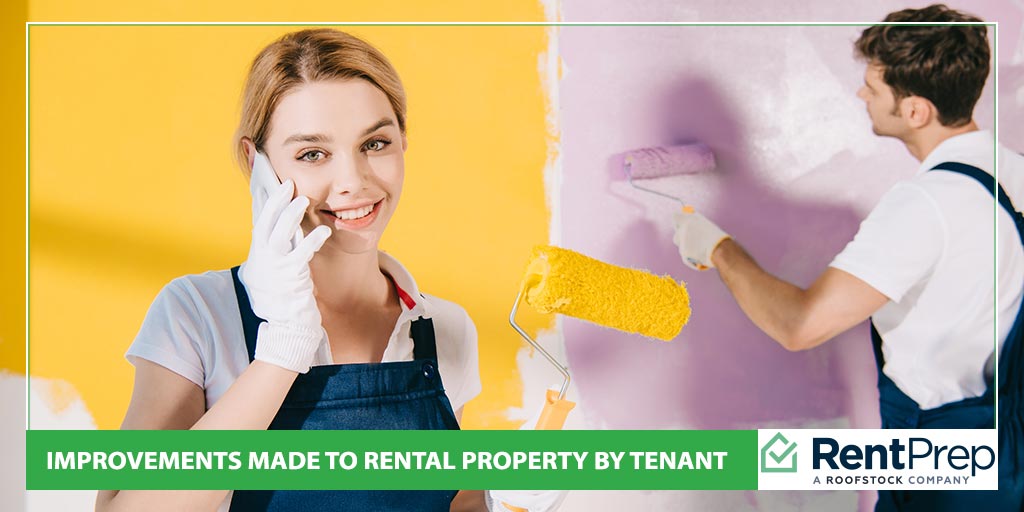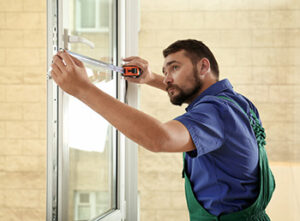

Any home improvements should be done by the landlord, but what happens when there are improvements made to the rental property by a tenant?
A good lease agreement should have some wording in it that forbids the tenants from making changes to the property, and if they do, they are responsible for restoring it to the original condition when moving out.
For most tenants, this usually means things like taking down blinds and putting up curtains, replacing cabinet hardware, or installing child safety latches on kitchen cabinets.
In general, tenants have no problem with putting things back in the original state when they move, and landlords usually aren’t bothered by these types of small, livable changes.
However, sometimes tenants take things a whole lot further and start doing more permanent home improvements to the property, creating a whole lot of breached boundaries and broken lease agreement clauses.

Most landlords deal with tenants making improvements to the property for the worse.
In other words, the worst tenants cause damage, fail to do proper maintenance, or otherwise wear out the home so that landlords have to restore the property to the original condition from a worse state via using the security deposit or funds from their own pocket.
On the other end of the spectrum, the very best tenants consider their rental property a true home and go out of their way to take care of it and improve it as much as they can.
Often, there’s a healthy relationship in place and tenants can ask permission from the landlord to do the improvements, and permission will generally be granted.
But what happens when tenants make more permanent home improvements to the property without checking first or obtaining the landlord’s permission? It’s a tricky dilemma that most landlords only wish was their biggest problem, but it is still a clear violation of the lease agreement.
Examples of rental property upgrades and improvements by tenants are usually something like this:
Anytime a tenant makes such a dramatic and permanent change, they are violating the lease agreement and landlords have the justification and legal standing to take action. They can even evict if they so desire.

Whether it’s a home improvement that landlords hate or love, tenants who make material changes to the rental property are technically violating the lease agreement and it can create a number of different issues for landlords. Even if the improvement is well above what the landlord would have done, in terms of cost or material, it doesn’t make it a right decision that should be ignored.
The bottom line is that tenants who make improvements to the look and function of the rental property without permission are showing that they don’t respect the landlord or the lease agreement, even though the change may be considered an improvement or an upgrade.
When the tenants improve the property in some way, landlords frequently tend to take a more lenient approach and not say pr do anything about it. But should they?
It doesn’t matter what the feature of the property was like before the change. As long as the property was deemed habitable, the landlord’s version of the home must be acceptable and technically should never be altered without express permission.
Upon discovering a tenant home improvement project, many landlords might look at it as a stroke of luck, and something they don’t have to do for themselves down the road. However, there are several things to consider:
All these dilemmas and more are lurking just below the initial reaction that a landlord may have upon seeing an unauthorized home improvement for the first time.
There is no right answer for this question because so much depends on what was done, the type of renters they are, the relationship between the landlord and the tenants, the condition of the rental property and what the landlord’s ultimate interests are. However, there are some universal steps that landlords should take in dealing with tenants that make home improvements.
Here are 5 things that landlords should always do when discovering unauthorized home improvements:
Keeping an attractive rental property full of good tenants is the ultimate goal of landlords, and each instance needs to be determined carefully. However, landlords would be wise to set up or reaffirm the conditions in the lease agreement for alterations, even if they lucked out this time and the home improvement truly is an “improvement.” Any violation of the lease agreement just opens the door for the next instance being not so lucky for the landlord.
Sometimes a tenant may remove an update such as a light fixture, smoke detector, or blinds. This is never permissible unless the landlord approved of the removal of these improvements. If the tenant removes improvements they may be charged for them upon leaving the rental. In most cases, the landlord will keep some or all of the security deposit to cover their costs.
Our tenant screening services have been trusted by over 100,000 landlords & property managers since 2007. SEE OUR PACKAGES
Starting at just $21.00!